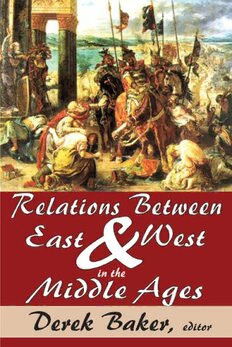Download Relations Between East and West in the Middle Ages PDF Free - Full Version
Download Relations Between East and West in the Middle Ages by Derek Baker in PDF format completely FREE. No registration required, no payment needed. Get instant access to this valuable resource on PDFdrive.to!
About Relations Between East and West in the Middle Ages
In the Roman Empire, relations between East and West meant connections between the eastern and western parts of a unified structure of empire. Romans sometimes complained about the corrupting influence on their city of Greeks and Orientals, but they employed Greek tutors to educate their sons. People did not think of the eastern and western parts of the empire as being separate entities whose relations with each other must be the object of careful study. Even at the moment of the empire's birth, there was a clear idea of where the Latin West ended and the Greek East began. This began to change with Constantine, when the Roman Empire was split in two, with Rome itself in decay. This volume, first published in 1973, derives from a colloquium on medieval history held at Edinburgh University. Its theme was the fl uctuating balance-of-power of Latin West and Greek East, Rome and Constantinople. The book starts with Justinian's attempt to reunite the two halves of the old Roman Empire and then goes on to consider the polariation of Christianity into its Catholic and Orthodox sectors, and the misunderstandings fostered by the Crusades; and ends with the growing power and conquests of Islam in the fourteenth century. The contributions included in Relations between East and West in the Middle Ages are: Old and New Rome in the Age of Justinian, by W. H. C. Frend; The Tenth Century in Byantine-Western Relationships, by Karl Leyser; William of Tyre, by R. H. C. Davis; Cultural Relations between East and West in the Twelfth Century, by Anthony Bryer; Innocent III and the Greeks, Aggressor or Apostle? by Joseph Gill; Government in Latin Syria and the Commercial Privileges of Foreign Merchants, by Jonathan Riley-Smith; and Dante and Islam, by R. W. Southern. Derek Baker was lecturer in medieval history at the University of Edinburgh. In addition to this book he is the editor of Medieval Women and England in the Early Middle Ages.
Detailed Information
| Author: | Derek Baker |
|---|---|
| Publication Year: | 1973 |
| ISBN: | 9780202363325 |
| Pages: | 168 |
| Language: | English |
| File Size: | 4.028 |
| Format: | |
| Price: | FREE |
Safe & Secure Download - No registration required
Why Choose PDFdrive for Your Free Relations Between East and West in the Middle Ages Download?
- 100% Free: No hidden fees or subscriptions required for one book every day.
- No Registration: Immediate access is available without creating accounts for one book every day.
- Safe and Secure: Clean downloads without malware or viruses
- Multiple Formats: PDF, MOBI, Mpub,... optimized for all devices
- Educational Resource: Supporting knowledge sharing and learning
Frequently Asked Questions
Is it really free to download Relations Between East and West in the Middle Ages PDF?
Yes, on https://PDFdrive.to you can download Relations Between East and West in the Middle Ages by Derek Baker completely free. We don't require any payment, subscription, or registration to access this PDF file. For 3 books every day.
How can I read Relations Between East and West in the Middle Ages on my mobile device?
After downloading Relations Between East and West in the Middle Ages PDF, you can open it with any PDF reader app on your phone or tablet. We recommend using Adobe Acrobat Reader, Apple Books, or Google Play Books for the best reading experience.
Is this the full version of Relations Between East and West in the Middle Ages?
Yes, this is the complete PDF version of Relations Between East and West in the Middle Ages by Derek Baker. You will be able to read the entire content as in the printed version without missing any pages.
Is it legal to download Relations Between East and West in the Middle Ages PDF for free?
https://PDFdrive.to provides links to free educational resources available online. We do not store any files on our servers. Please be aware of copyright laws in your country before downloading.
The materials shared are intended for research, educational, and personal use in accordance with fair use principles.

